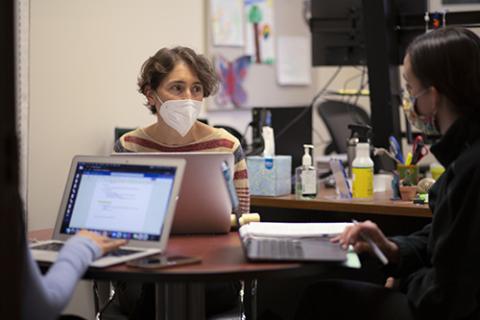New UCLA Law Clinic Advocates for Refugees from Afghanistan

When the United States withdrew the last of its troops from Afghanistan in the summer of 2021, many were captivated by images of Afghan citizens clamoring to leave the country, even hanging from the landing gear of U.S. military planes.
Many of those who escaped will end up in California, where they will seek legal U.S. immigration status. In January 2022, a group of eight UCLA Law students led by Nina Rabin, director of the Immigrant Family Legal Clinic, partnered with immigration advocacy organization Human Rights First to help with those immigration claims. Now, what began as a short-term “mini-clinic” has led, for four of the students, to ongoing advanced work in the clinical setting.
The January session—or “J-Term”—mini-clinic began with a three-day intensive training. After the training, the mini-clinic students conducted remote consultations with ten Afghan refugees, who were still being processed at military facilities throughout the U.S.
Clients included women’s rights activists and individuals who had worked with the former Afghan government and United States military.
“Everybody was generally aware in the headlines of when the evacuation happened from Afghanistan,” Rabin says. But students in the mini-clinic came to understand the situation on a far deeper level by “actually hearing the stories of evacuees, both about the evacuation itself and the bravery of the people in the months, and in many cases, years leading up to it.”
But the evacuees’ ordeals didn’t end when the refugees arrived on U.S. soil. Rabin explains that many Afghan refugees have been provided temporary permission to stay in the U.S. and have two years to establish a legal basis to remain. That’s where the mini-clinic came in.
The law school worked with Human Rights First and its Afghan Legal Assistance program, a national project to connect Afghan evacuees with legal services. Memos prepared by the students after interviewing refugees will help Human Rights First evaluate the cases and connect Afghan refugees with pro bono attorneys.
Or, as Shayla Gafary, managing attorney for the Afghan Legal Assistance program, puts it, “All of this is trying to use fancy laws and lawyer talk to make sure that they have the kinds of documents that they need so that they are able to live here and work here and do so with the security that they are not going to have to be returned to a country where they’ll face certain deaths.”
Mini-clinic success leads to new advanced clinic
UCLA Law has now extended the project into an advanced intensive for four of the students, .who are now providing full pro bono representation in the asylum claims of two evacuees identified through the screening interviews.
Students in this advanced program are gathering extensive factual and expert evidence, researching caselaw and country conditions to write briefs on asylum eligibility, and preparing their clients to testify. Later this spring, they will accompany their clients to an interview before United States Citizenship and Immigration Services (“USCIS”), where an officer will conduct an interview and determine whether to grant their asylum claims.
Clinic builds transferable skills
Clinic students have learned everything from the legal basics of asylum claims and immigrant visas to trauma-informed interviewing.
According to 3L Nick Levson, “I had two reasons for choosing this clinic. I wanted to gain experience and build skills working with real clients and I wanted to do work to help Afghan evacuees, who I feel are owed a great deal.”
Third-year student So-Young Kim says the clinic taught her about being sensitive toward a client’s trauma while obtaining information to achieve a specific legal objective.
Because the U.S. government is expediting asylum claims by evacuated Afghan refugees, Rabin anticipates that the clinic clients’ asylum interviews before the USCIS will be held by the end of the spring semester. Decisions aren’t expected several months after that. While it will take time to see their work come to fruition, students in the clinic are hopeful for their clients’ futures.
“Through this clinic, we’ve been able to help our clients navigate a very complex system and be a source of confidence and optimism in the face of uncertainty,” remarks 2L Rose Chute. “Most importantly, I hope our work this semester leads to a happy ending: our client and his family being granted asylum.”